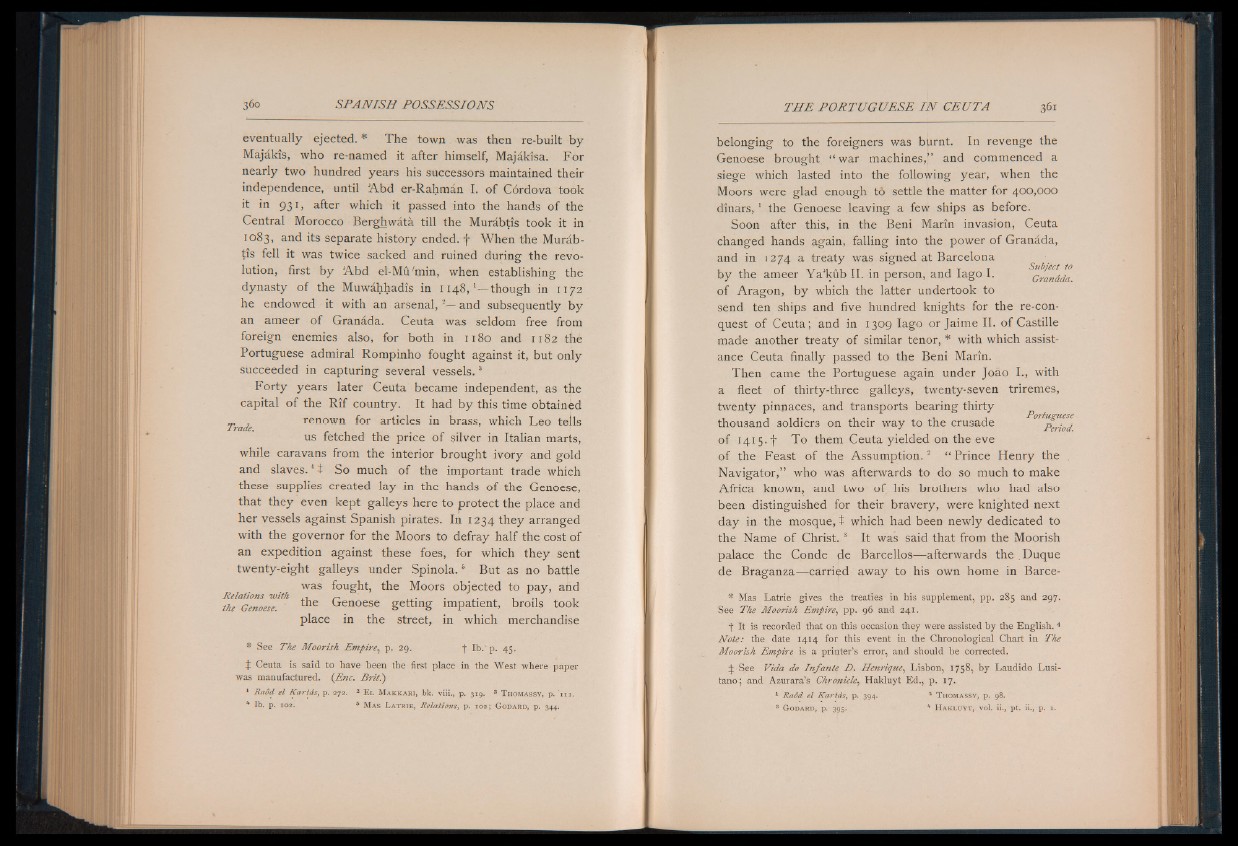
eventually ejected. * The town was then re-built by
Majàkis, who re-named it after himself, Majakisa. For
nearly two hundred years his successors maintained their
independence, until 'Abd er-Rahmàn I. of Córdova took
it in 931, after which it passed into the hands o f the
Central Morocco Berghwàtà till the Murabtis took it in
1083, and its separate history ended, f When the Murabtis
fell it was twice sacked and ruined during the revolution,
first by Abd el-Mu 'min, when establishing the
dynasty of the Muwahhadis in 1 148 ,‘ -—though in 1172
he endowed it with an arsenal, ■— and subsequently by
an ameer of Granada. Ceuta was seldom free from
foreign enemies also, for both in 1180 and 1182 thè
Portuguese admiral Rompinho fought against it, but only
succeeded in capturing several vessels.3
Forty years later Ceuta became independent, as the
capital o f the Rif country. It had by this time obtained
j renown for articles in brass, which Leo tells Irade.
us fetched the price of silver in Italian marts,
while caravans from the interior brought ivory and gold
and slaves. 41 So much of the important trade which
these supplies created lay in the hands of the Genoese,
that they even kept galleys here to protect the place and
her vessels against Spanish pirates. In 1234 they arranged
with the governor for the Moors to defray half the cost of
an expedition against these foes, for which they sent
twenty-eight galleys under Spinola.5 But as no battle
was fought, the Moors objected to pay, and
Relations with ^ . . . . ,
the Genoese. the (jenoese g a tin g impatient, broils took
place in the street, in which merchandise
* See The Moorish Empire, p. 29. | lb.* p. 45.
J Ceuta is said to have been the first place in the West where paper
was manufactured. (Enc. Brit.)
1 Raód e l Kartds, p . 272. 2 E l M a k k a r i , bk. viii., p . 319 . 3 T h om a s s y , p. 1 1 1 .
* lb . p . 102. 3 M a s L a t r i e , Relations, p . 102 ; G o d a r d , p . 344.
belonging to the foreigners was burnt. In revenge the
Genoese brought “ war machines,” and commenced a
siege which lasted into the following year, when the
Moors were glad enough to settle the matter for 400,000
dinars,.1 the Genoese leaving a few ships as before.
Soon after this, in the Beni Marin invasion, Ceuta
changed hands again, falling into the power of Granada,
and in 1274 a treaty was signed at Barcelona
by the ameer Y a ‘kub II. in person, and Iago I. Granada.
of Aragon, by which the latter undertook to
send ten ships and five hundred knights for the re-conquest
of Ceuta; and in 1309 Iago or Jaime II. of Castille
made another treaty of similar tenor, * with which assistance
Ceuta finally passed to the Beni Marin.
Then came the Portuguese again under Joao I., with
a fleet of thirty-three galleys, twenty-seven triremes,
twenty pinnaces, and transports bearing thirty
Portuguese
thousand soldiers on their way to the crusade Period
of 1415.4 To them Ceuta yielded on the eve
of the Feast of the Assumption.2 “ Prince Henry the
Navigator,” who was afterwards to do so much to make
Africa known, and two of his brothers who had also
been distinguished for their bravery, were knighted next
day in the mosque, t which had been newly dedicated to
the Name of Christ.3 It was said that from the Moorish
palace the Conde do BarcellosB-afterwards the .Duque
de Braganza— carried away to his own home in Barce-
* Mas Latrie gives the treaties in his supplement, pp. 285 and 297.
See The MooHsh Empire, pp. 96 and 241.
f It is recorded that on this occasion they were assisted by the English. 4
Note: the date 1414 for this event in the Chronological Chart in The
Moorish Empire is a printer’s error, and should be corrected.
£ See Vida do Infante D . Henrique, Lisbon, 1758} by Laudido Lusi-
tano; and Azurara’s Chronicle, Hakluyt Ed., p. 17.
1 Raod el Kartds, p. 394. 2 T h o m a s s y , p. 98.
3 G o d a r d , p. 395. h H a k l u y t , vol. ii., pt. ii., p. 1.